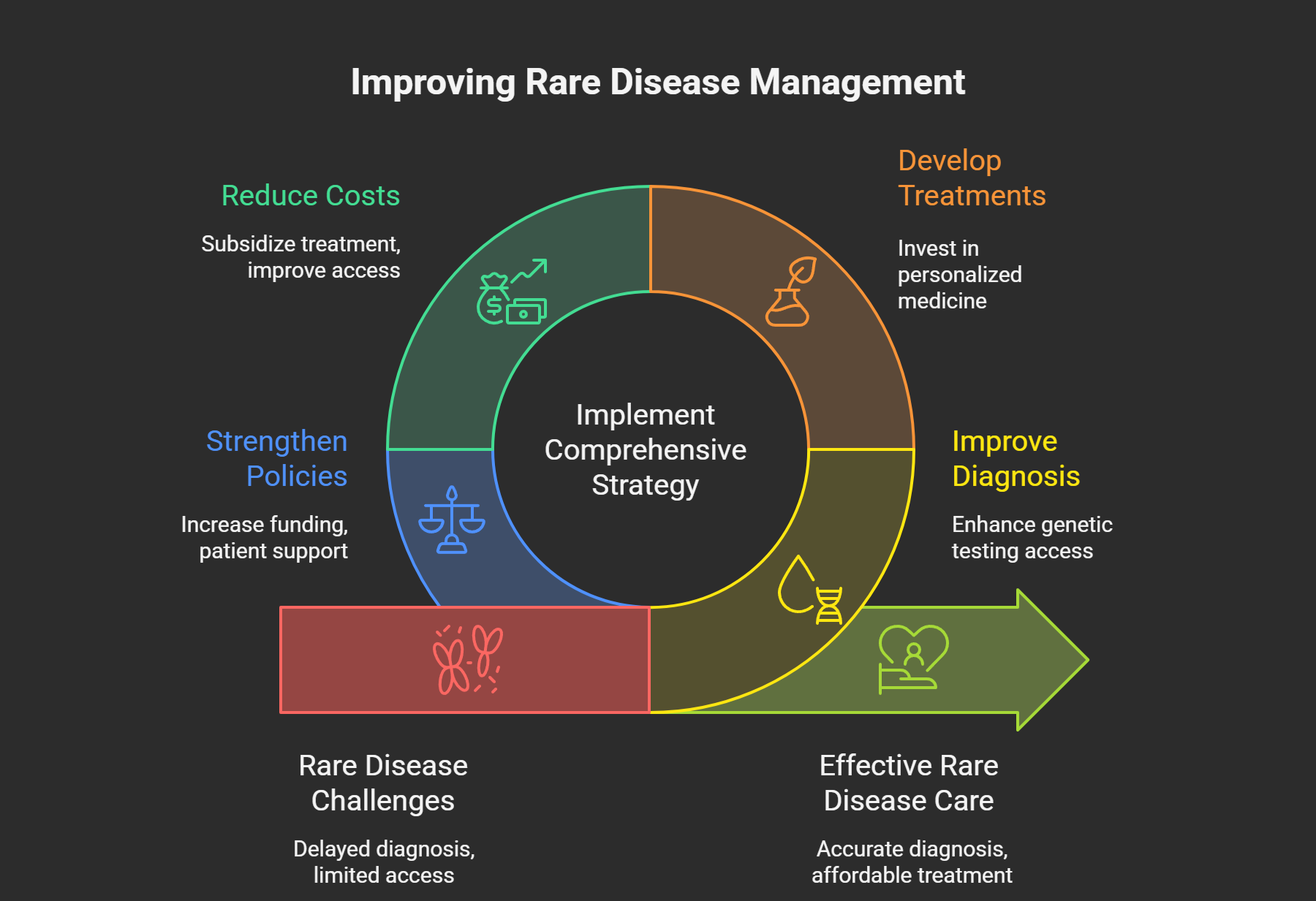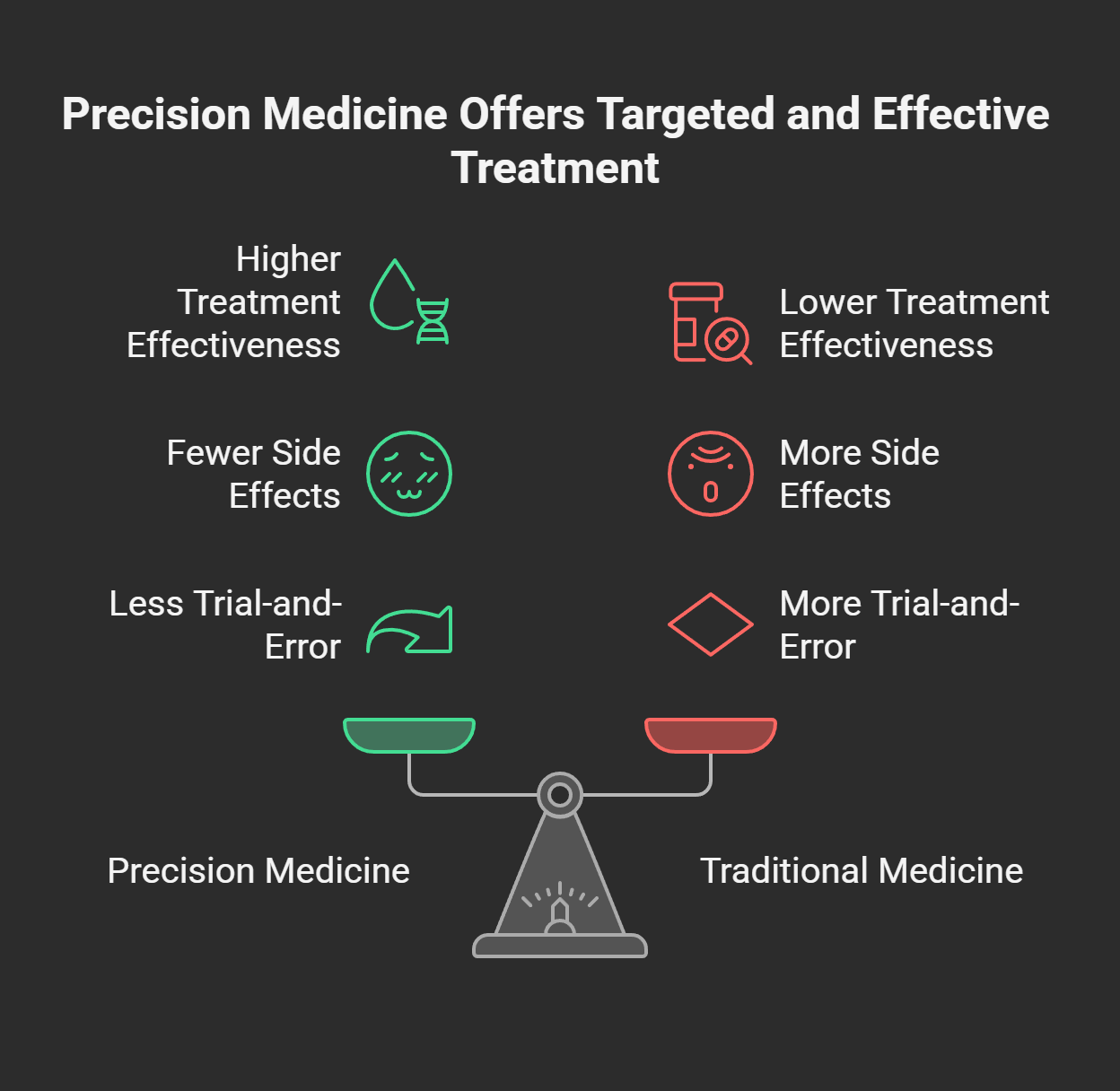Imagine living with a condition that impacts a tiny fraction of the population in the country. Imagine months and sometimes years of searching for a diagnosis, to be told treatment options either do not exist or they are priced out of reach. This is the plight of millions of rare disease patients in India. With over 7,000 identified rare diseases throughout the world, India alone estimates that around 70 million people live with such conditions (Source: ICMR). The problem of Rare diseases in india is severe; however, some rays of hope do shine through called precision medicine genomics.
In contrast to the traditional way of viewing disease therapy, the concepts of precision medicine advantages focus on healthcare solutions around the individual patient, taking genetic, environmental, and lifestyle factors unique to the patient into consideration. Such approaches combine multi-omics solutions, advanced diagnostics, and targeted therapy for greater customization of treatment in terms of individual patient tolerance, enhancing the chances of improved outcomes.
Uncoded by Premas Life Sciences is dedicated to equipping the healthcare and research communities with tools at the cutting edge of innovation that will facilitate significant breakthroughs in disease diagnosis and treatment. We have over 17 years of experience as not only suppliers but partners in discovery, justly pursuing our goal of revolutionizing precision healthcare by precluding full accessibility and effectiveness in rare disease treatment.
The Growing Challenge of Rare Diseases in India
Perniciously rare, nevertheless, these diseases collectively affect millions, furthering variety. Each condition affects a minuscule number of people, thereby giving much trouble in diagnosis and cure. Some of the important points are:
- Delayed or Misdiagnosis: Several rare diseases do display common symptoms, leading to years of misdiagnosis. Example: Some overlapping signs are present in Gaucher disease and anemia, leading to misdiagnosis on repeated occasions.
- Restricted Access to Advanced Testing: Genetic testing and multi-omics analysis that is essential for the diagnosis of rare diseases are simply beyond the reach of many patients on account of high pricing and poor availability.
- No Targeted Treatments: There are no new treatments once the rare disease is positively diagnosed. Targeted therapy platforms involving personalized medicine and genomics approaches to treatment are available for only a few rare diseases in India.
- Treatment Generally Expensive: Rare diseases taking enzyme replacements average treatment costs several lakhs per annum for rare disease treatment, thus making it beyond the reach of a majority of families.
- Gaps still exist concerning regulation and policies: India has witnessed progress on a lot of fronts regarding rare diseases (an instance being the National Policy for Rare Diseases 2021), however, gaps still exist on funding, access to treatments, and patient support.

Here, precision medicine intervenes. By disproportionately locating the diagnostic crosshairs on the genetic and molecular basis of disease, we are whittling our options down from doing something about the symptoms to doing everything to solve the individual patient.
How Precision Medicine is Transforming Rare Disease Treatment?
1. Multi-Omics: Decoding Diseases at the Molecular Level
The approach to understanding the complexities of rare diseases has to be all-encompassing and multi-layered. The multi-omics solutions, those blending genomics, transcriptomics, proteomics, and metabolomics, would take into account the crucial molecular view of these mechanisms. Uncoded serves researchers working to:
- Find genetic mutations leading to diseases with next-generation sequencing (NGS) and whole genome/exome sequencing.
- Look further into how such genes interplay with external factors in the prediction of disease progression.
- Formulate advantages of personalized medicine protocols based on molecular profiles rather than generalized clinical features.
With Spinal Muscular Atrophy (SMA), for instance, knowing the exact mutation in the SMN1 gene prompts the customized therapies that better support patient survival rates.
2. Targeted Therapy: Personalizing Treatment for Maximum Efficacy
Targeted therapy is the way treatment is designed to hit the disease-causing molecular pathways. The precision medicine advantages are manifold:
- Higher effectiveness: Medicines have been developed uniquely for the genetic mutation implicated in the disease.
- Fewer side effects: Collateral damage to normal cells is cancers if these agents can direct their action explicitly to the defective pathways.
- Less trial-and-error method: Precision diagnostics have paved options for doctors with obvious efficacy in mind.

Take, for instance. Enzyme replacement options in therapy have been targeted in the treatment of such rare diseases as Fabry disease and Pompe disease.
3. Gene Therapy & CRISPR: Revolutionizing Rare Disease Treatment
Gene therapy and CRISPR technology would perhaps rank as the most thrilling applications of precision medicine. Rather than ameliorating signs and symptoms of a disorder like traditional therapeutics, these interventions hoped to cure patients by correcting the underlying genetic defect.
Some key breakthroughs include:
- Gene replacement therapy for SMA that restores the production of essential motor neuron proteins
- CRISPR-based treatment for sickle cell disease, in which faulty haemoglobin genes are repaired
- RNA-based therapies modify gene expression at the cellular level to counteract disease progression.
This is where Uncoded comes in equipping researchers with the tools that make these frontiers accessible while hastening ground breaking cures.
Challenges in Implementing Precision Medicine in India
Even so, incorporating precision medicine into India’s healthcare concept comes with problems:
- High Cost of Genetic Testing and Treatment: The promotion of precision diagnostics will require government assistance and financial arrangements with the industry to lower costs.
- Inadequate Infrastructure & Expertise: Another area of human resources is the glaring lack of trained personnel in genomics, molecular diagnostics, and bioinformatics if precision healthcare is to become a viable proposition in India.
- Regulatory and Ethical Constraints: The provisions of a comprehensive policy and safeguards address the issues of data privacy, ownership of genetic data and ethical controversies related to gene-editing technologies.
- Access to Advanced Research Tools: Demand for state-of-the-art, multi-omics platforms for research has gone up. Currently, the platforms are only available in a handful of institutions.
Addressing these issues will require collective efforts from all stakeholders including policymakers, healthcare providers, researchers and industry leaders.
The Future of Precision Medicine in India
Prospects for precision medicine in India are bright, as progress in technology will bring about cost reduction in:
- Extended new born screening programs to enable early detection of rare genetic disorders;
- AI application in genomics to ensure access to more accurate precision diagnosis;
- Increased telemedicine applicability for genetic counselling to reach out to remote areas for patients
- More public-private partnerships thus speeding up research and drug development efforts.
At Uncoded by Premas Life Sciences, we are committed to ensuring that everyone on this earth gets precision healthcare as intended. By way of advanced multi-omics solutions, we are enabling researchers and clinicians to unlock the future of medicine—one discovery at a time.
Conclusion
Moving Towards a Healthier Future: The journey for rare diseases in India is long but with the realization of precision medicine, we are far closer to actual solutions. What years patients used to suffer in uncertainty, now, it is possible to provide quick and accurate diagnoses with cures that change lives.
At Uncoded, we believe that health should be about accuracy rather than probabilities. And thus we are committed to providing the scientific community with the best advanced tools that turn possibilities into breakthroughs. Because when we unlock the mysteries of disease at the molecular level, we open the door to a healthier future for all.
Frequently Asked Questions:
1. What is the role of precision medicine genomics in treating rare diseases?
Precision medicine genomics focuses on using a patient’s unique genetic data to design targeted therapies. For rare diseases, where conventional treatments are limited, genomics helps identify mutations at the molecular level, enabling doctors and researchers to provide more accurate diagnosis and personalized treatment plans. This approach improves the chances of success and reduces trial-and-error in therapies.
2. What are the precision medicine advantages for patients with rare diseases?
The key precision medicine advantages include faster and more accurate diagnoses, treatments tailored to the genetic makeup of the patient, fewer side effects, and higher effectiveness. For rare disease patients, this means reduced suffering, quicker access to therapies, and more affordable long-term care options compared to traditional trial-and-error methods.
3. How do advanced healthcare approaches help in rare disease treatment?
Advanced approaches such as genetic testing, molecular diagnostics, and next-generation therapies provide a more precise understanding of the root causes of rare diseases. By identifying the exact genetic mutation or pathway responsible, treatments can be tailored to the patient, improving outcomes and reducing unnecessary trial-and-error in therapies.
4. What is the future of rare disease treatment in India?
The future looks promising as technology becomes more affordable and accessible. Wider newborn screening, improved infrastructure for genetic testing, and public-private partnerships will speed up research and drug development. With better awareness, investment, and collaboration, patients in India could benefit from quicker diagnoses and more effective treatments in the coming years.
5. How is Uncoded helping in the fight against rare diseases?
Uncoded provides access to state-of-the-art tools and technologies that enable faster diagnosis and more targeted treatment approaches for rare diseases. By bridging the gap between research and clinical application, it helps shorten the long and uncertain journey patients face from diagnosis to treatment.

